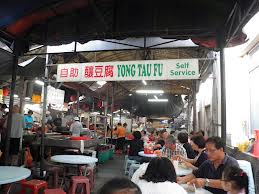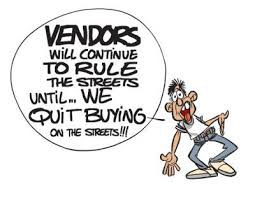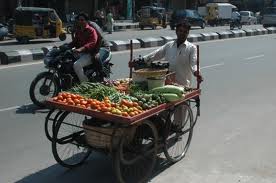The consumers also are willing to buy from the hawkers and street vendors, for the reason that the price of commodities and services offered by the street vendors would be normally less than the price of the same from shops and super-markets, for obvious reasons.
Some people are crazy in buying things from the hawkers after bargaining and they really enjoy after their successful bargaining and purchases.
There are many mobile and stationary-‘Hawkers’ and ‘Street Vendors’ in many countries including India, selling many items including eatables on the road-sides, streets and platforms.
In India, there are more than 10 million street vendors, in metropolitan cities, including Mumbai, New Delhi, Kolkata, Chennai, Hyderabad, Bangalore and Ahmedabad.
The Government of India had introduced a ‘License System’ to regulate and control street vending activities in the cities and towns.
However, there have been many people engaged in street vending, without proper license.
Consequently, such street vendors have been causing problems to the legitimate vendors and they have been facing problems by the local police and municipal authorities.
Many street vendors get evicted and lose their goods and business accessories and undergo legal actions by the police and go to the court and pay fines.
And also, there have been cases of bribing the authorities and giving money as ‘mamool’/levy to the local ‘dhadhas’.
In some of the cities like Kolkata, street vending / hawking has been a non-bailable offence.
Similar to many workers, labourers and traders the street vendors in India also started organizing themselves by forming political and non political -‘unions’ and ‘associations’.
Some Non-Government Organizations/NGO’s also started working for the street vendors. One of such NGO is “The National Association of Street Vendors of India”/NASVI based in Delhi.
In the year 2010, the Supreme Court of India had recognized ‘street vending’ as a source of livelihood and directed the Government of India to frame a law to regulate and control ‘street vending’ in India.
Accordingly, on 11th November 2011 /11 11 11, a bill was drafted by the Government of India, with the help of the National Advisory Council / NAC, chaired by Ms.Sonia Gandhi providing:
- Protection from police and civic authorities to legitimate street vendors,
- Demarking ‘vending zones’ on the basis of ‘traditional natural markets’ with
- Proper representations of vendors and women in the decision making bodies and
- Establishing effective grievance redressal and dispute resolution mechanism.
- Any person, above 14 years of age, intending to undertake street vending needs to register with the Town Vending Committee/TVC.
- The TVC comprises of the municipal commissioner, representatives of street vendors, local authority, planning authority, local police, resident welfare association and other traders associations.
- He/She may then apply for a vending certificate that will be issued based on various criteria
- The state government shall frame a scheme for street vendors
- The local authority shall, in consultation with the planning authority, frame a street vending plan once every five years
- The Bill does not specify principles to be followed by governments in issuing vending certificates, allocating vending zones and the number of vendors per zone.
- This Bill shall not apply to Railways land, premises and trains. However, ‘The Standing Committee’ of the Parliament of India has suggested making the Bill applicable to the Railways, incorporating specific provisions of the scheme in the Bill, and consultation with the TVC on the vending plan
- Currently, street vending is regulated under municipal laws enacted by state legislatures.
- Parliament’s competence to legislate on this issue depends on whether the Bill is interpreted as substantively addressing rights and obligations of street vendors/Concurrent List or relating to municipal zoning/State List
- The Bill does not require the stakeholders to be consulted in the formulation of the street vending plan.
- The central law will have overriding effect on state laws that are inconsistent with the Bill. Current state laws differ with the Bill in terms of powers of the TVC, and mechanism for dispute resolution
- The present bill differs from the draft bill, which ensured that the ‘Town Vending Committees’/ TVC) would have at least 40 per cent representation of street vendors.
- However the final bill presented and passed in the Parliament of India, the civic bodies, which have no representation of street vendors, are made the final authority on all issues concerning their fate, including the rehabilitation and resettlement plans
- And the bill also have legal ambiguities, such as there is no clear definition of “public purpose land”.





















Looks like there are going to be a few amendments to his bill. As i heard on this news. Read http://www.ugc.ac.in.
Finally one important bill to protect the poor. Check Vyapam notification.